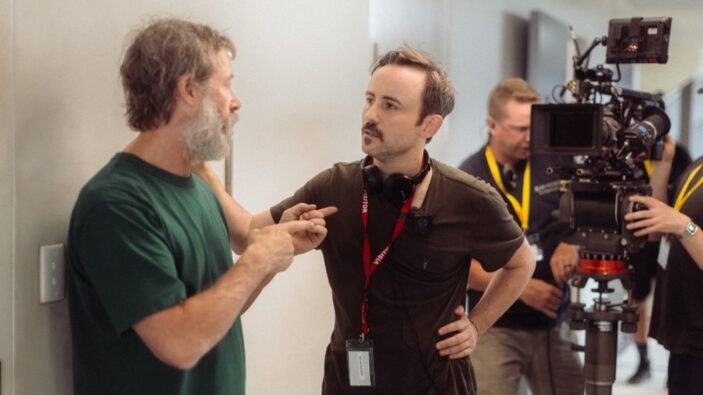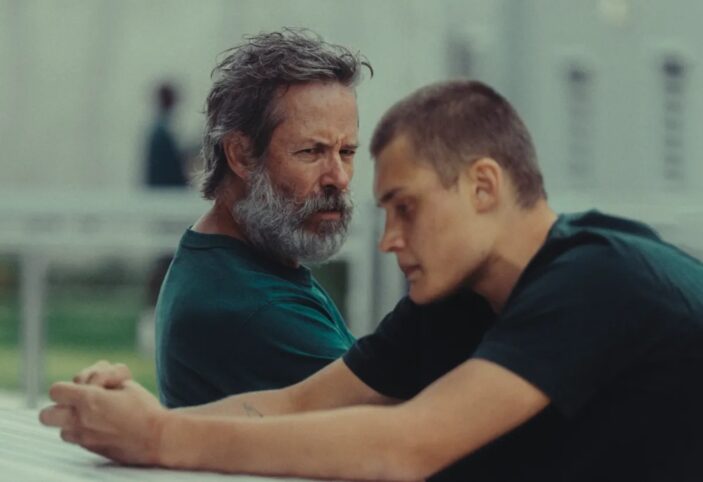
Transferred from juvenile to adult prison, Mel is taken under the wing of both Shepard, Australia’s most despised criminal, and Warren, a soon-to-be-a-paroled inmate. The paternal triangle that forms between them becomes their undoing.
From Cannes Film Festival-winning director Charles Williams, Inside is a tale of emotional dynamics within the prison system, spearheaded by a trio of winning performances from Guy Pearce, Cosmo Jarvis and newcomer Vincent Miller.
Following its premiere at last year’s Melbourne International Film Festival, Inside is releasing in Australian theatres, and to coincide our Peter Gray spoke with writer and director Williams about subverting the traditions of the “prison film”, how he fused professional actors with actual inmates on screen, and how his award-winning short film served as inspiration.
I think we have an idea of what a prison “should” be, and we think of films like The Shawshank Redemption as inspiration. But Inside had this One Flew Over The Cuckoo’s Nest-like mentality. Was that intentional on your behalf to subvert that expectation?
A little bit. I wasn’t aiming to make a prison movie, in a way. The world of it felt inevitable that these characters would go to prison, and, you know, family members of mine and people I knew have gone to prison, and when they went, it was more like (Inside). It was, like, “Where are all the officers?” and “Where’s all the clanking bars?” There was a level of interest in this, but I do think it’s more like Cuckoo’s Nest in that vein.
That film is a masterpiece, but it’s a prison film in terms of its genre. It has two key ingredients. You have corruption of authority and you’ve got someone trying to escape in a very literal sense. Authority being corrupt is sort of every prison movie. Shawshank‘s the same. He’s trying to tunnel his way out. Authority is corrupt. But those two things are fine for that genre, but they were never my experience of what life was like. Not just in my own personal (life), but doing research and the years spent (visiting) prisons, I met a ton of guys who are just working a job. I knew officers that had family in prison. And they weren’t scheming, it was just them trying to get overtime pay.
It’s always been an area that’s fascinated me. You hear how people have jobs and have access to education in there. There are people who are better off in prison than they are outside. And with that, are you looking at anything specific within the prison setting to develop your visual language for the film? I was surprised at how not claustrophobic it was.
That was very important. I think the key for me was that I wanted the prison to feel like purgatory. But it was this blank space that was unnerving in its own way, but not in a dark, dank, scary way. There was a semi-spiritual quality to it. It would be raw and grounded, but the cells would have windows that are just above their heads, and the light is tipping in a bit. I could go on forever about the lenses that we used and the processes that we did to make the light so it didn’t appear as clean. It wasn’t this world of grittiness that amps up the drama of (the story). We knew the story would do that by itself.
The scene where Guy Pearce’s character has the visit outside to see his son, it almost felt darker. It was that nice contrast of life outside isn’t as freeing as he expected it to be. And that scene was absolutely heartbreaking too. On the mention of Guy, how he did and Cosmo Jarvis, who’s just incredible in this, how did they come to be in the film’s orbit? And how was the process of finding Vincent Miller? I believe this is his first movie?
To touch on that first point, yeah, going outside the prison is a bigger prison than the prison itself, especially for Guy’s character. And that’s true for a lot of people I know that have the personality of Guy’s character. You think you know you want. You confuse freedom for liberty. You think you want to be unrestrained, and then you get outside and you’re the victim of your own prison. And you’re only three seconds out and you’re stealing something. When you’re at the mercy of your own impulses, the outside world is a bigger prison.
In terms of casting, yeah, Guy was really exciting for me. I don’t really think about casting while I’m writing, and after I had written it, it was like, “Shit! Who is this?” Guy was the first person that I thought of, because I’m not just a fan of his work, but it was that perfect thing where I’d never seen him do anything like this. But I also felt like it was totally within him to do it. It would be great to see him play this impulsive, self-centered kind of character. I knew he could connect to that. And once Guy was committed, which was quite early on, there was this feeling of, “Okay, not only do I need other great actors here, I need other presences.”
The guy who’s playing (the character of) Shepard needs to feel the opposite of that. He also needs to feel like there’s something that’s dangerous about him, and that way he never has to play dangerous. He can play it nice and innocent. He never has to act scary, because that’s the truth of that character.
And Vinnie was part of an open call. I just knew I needed someone with a very specific nature and presence and soul. We looked Australia wide for anyone between the ages of, I think, 14 and 30. Someone who could conceivably be an 18-year-old. And we narrowed it down to four kids, all who had different racial backgrounds and were very different ages. Vinnie just stood out from the beginning. You see him on camera, and you want to know what he’s thinking. There’s things you just can’t direct. I can’t make someone feel something as a director. I can’t make someone be enigmatic and interesting. Also, the innocent of his age behind his eyes meant that I could male the character not always that innocent, which would lead to unpleasant, complicated choices.

Yeah, when I was watching him there’s almost this instinctive feeling to want to wrap your arms around him. He doesn’t seem like he belongs there, but then you see the glimpses of his character’s violent nature. And Vincent’s performance is crazy. He really holds his own against everybody.
I mean, even Guy was saying how great it was to have him on set. Everyone kind of assumed that Vincent would really benefit from Guy being a guide, but Guy was saying how helpful it was to have Vinnie, because he’s a great listener in a scene. And that keeps you honest. You can’t just roll off lines and make the face. He’s really connecting with you. He was such a joy to work with. It was really exciting to direct someone that needed something very different from what I needed, and from what Cosmo needed. They all needed different directors.
And as you said that you know this world, was there any specific commentary on the prison system or its impact on individuals that you wanted to make with this?
I spent four years visiting prisons and meeting ex-prisoners, and I included them in the film. Pretty much every officer that’s not a main role is really an officer that currently works. And almost all the extras are former inmates I brought in. They were part of the process of the film as well. I could talk about just the prison incarceration issue, and juvenile detention in particular, and what the laws are there.
But I also think there’s a bigger (issue), which is forgetting prison. How do we all, in our daily lives, reckon with people that do damage to us and the damage we do? Even if it’s not criminal. What is forgivable and what isn’t? Some people are born a certain way, or they’re subject to serious abuse. They keep stealing my fucking car, but can you still give them the keys? I think that’s the thing that I like about movies, that they extrapolate something specific into something universal. Or something that’s human.
After All These Creatures did so well, was there the thought of expanding on that? Or what was the point for you where you knew Inside was your feature length debut as a filmmaker? How did it evolve for you?
Weirdly enough, Inside was expanding on All These Creatures to me. It really was. I could have stretched the story of All These Creatures out. I know a lot of filmmakers do that. You get a short film, and it’s a fast path to making it longer. But I’ve never seen those movies be interesting, because there’s a reason that they’re good as shorts.
I wanted to do the hardest thing I could do, which was essentially to take the things that were really compelling to me about All These Creatures, and reimagine them and make them into something I want to see if it were a feature film. I wanted to take the relationships and aesthetics and the themes, and paint a broader canvas.
Inside is screening in Australian theatres from February 27th, 2025.
